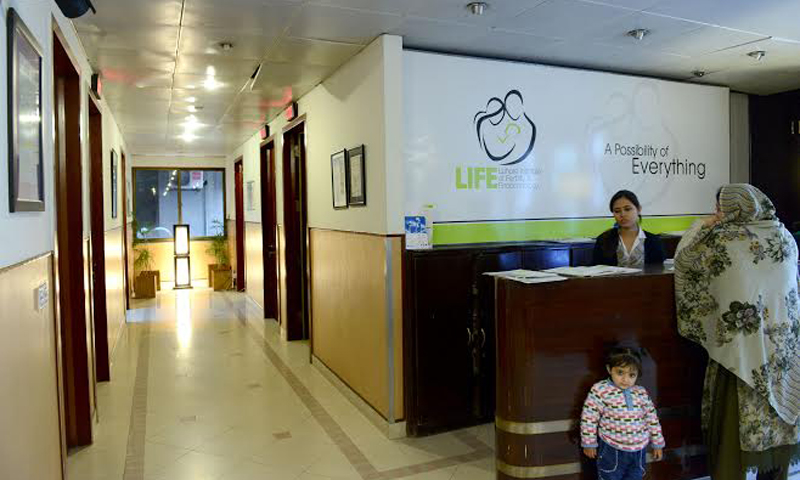
Atia General Hospital is just as crowded inside as it is outside. Neon letters of the hospital’s name on its signboard are almost overshadowed by mini-signboards advertising different doctors with various specialties. The hospital’s building, which appears to have three stories from the outside, is sandwiched between an under-construction structure and a school on Karachi’s congested Shahra-e-Faisal, near Malir.
But the hospital has a fourth floor, which reveals itself only once you are inside the building. Beyond the narrow corridors packed with patients, families, nurses and attendees and up the lift, lies the Sindh Institute of Reproductive Medicine (SIRM) on this hidden-from-view floor – a perfect symbol for the sensitive and not-so-public nature of the work going on there.
Also, compared to the floors below, it is rather swanky. The lift opens to marbled floors, an ‘S’ shaped front desk, fancy lighting, large (and rather spectacular) paintings and a flat screen television in the waiting room — business, it seems, is booming at the reproductive center, which offers treatments, including in-vitro-fertilization (IVF), to childless couples.

There is an aura of secrecy around the place. Doctors evade questions about their patients and the treatments they are getting, and patients waiting outside the doctors’ rooms tightly clutch their personal files. Mostly men, with few women under heavy veils dotted among them, they avoid to take any questions about the reasons for them being there.
Decidedly, SIRM is offering cure to no ordinary disease. Being unable to bear a child carries a big social stigma in our part of the world and taking medical help to overcome the problem is not something that our culture, heavily informed by religion, can be easily comfortable with. Dr Shaheen Zafar, who runs SIRM, sounds unsurprisingly careful when she says that her centre offers treatment only within the limits of the Islamic law.
In a September 2013 meeting, the Council of Islamic Ideology (CII) – a constitutional body tasked with giving recommendations on religious issues to the parliament – discussed the use of biological technologies and scientific innovations in situations involving rape, conception, birth and delivery. In a statement after the meeting, the council controversially rejected DNA testing as admissible evidence in rape cases. It also declared cloning and sex change as being un-Islamic. But it gave the green light to test-tube babies (the popular term for babies born through IVF treatment) as long as the method is practised within the limits of Shariah – that is, only husband and wife can opt for IVF, without the involvement of a third party.

Compare this with what Dr Rashid Latif encountered when he was working on the first test tube babies in Pakistan in 1980s. “People began speculating that IVF was an attempt to create babies who would become agents of either America or the Socialist bloc,” says Latif, who now runs Hameed Latif Hospital in Lahore, the largest private IVF facility in Pakistan.
He started working on the technology in 1984 (six years after the first successful test tube baby, Louise Brown, was born in 1978 in Britain), upon his return from Australia where he had attended a workshop on IVF. At the time, the technology was unheard of in Pakistan and knowledge about it was limited even among gynecologists.
Latif and his team also messed it up for themselves by jumping the gun and informing the media as soon as they knew that one of their first patients had been pregnant. “Unfortunately, we lost that first pregnancy,” recalls Latif. This failure, after a public announcement, attracted all kinds of negative views, especially by religious scholars. So, Latif was absolutely secretive about the second IVF pregnancy that happened in 1988, a full four years after the first.

Zeba Ashraf was one of Latif’s earliest patients. After six years of trying and failing to conceive, she was told that she would never have children. But, as the wife of a practicing doctor she had a lot of faith in what science could do. Today, she and her husband, Dr Muhammad Ashraf, are proud parents to 24 year olds Sara, Ahsan and Ali – Pakistan’s first IVF triplets – born on October 15, 1989.
Zeba tells the Herald how she was planning on going to England for treatment when she heard about Latif and IVF treatment he was offering in Lahore. She flew from Karachi to Lahore along with her husband to see the doctor, who told the couple that they were “very illegible” for the procedure.
“There was an instant connection. I felt very comfortable with him [Latif],” says Zeba, who went under treatment soon after. The procedure was carried out and, after 48 hours, she was told it was a success. The human cells, prepared outside her body in a Petri dish (or a test tube), were planted in her uterus. After some time, she took a pregnancy test, which came positive. “I was elated. I started crying and praying,” recalls Zeba.
She says her family was very supportive and she never faced any social or religious problems for undergoing the treatment. Neither did she want to keep it a secret, despite facing questions such as: “Why spend so much money on this?” Or remarks like: “Might as well have remarried.”
Zeba insists, however, that the social stigma attached to technologies such as IVF is “all cultural, not religious”. Her daughter, Sara, says “more than anything else, there was perhaps a lot of curiosity” about the procedure before she was born. “Since it was an alien concept,” she adds.

It can be argued that Zeba and her children did not have to contend with any social, cultural or religious problems because of their upper middle class, educated background. For those coming from conservative rural backgrounds or uneducated families, the situation can be quite different.
According to Dr Seher Seemi, who works as an IVF consultant at SIRM, the reason why some people might be hesitant to go under the treatment is due to a lack of awareness about it as well as religion. But she also points out that “people have become more accepting and open to this form of treatment for infertility”.
Latif can take credit for some of this acceptance. After he achieved the successful second pregnancy through IVF, he called on about 10 religious scholars, personally visiting their homes to discuss the topic and to explain to them that there was nothing “wrong, illegal or anti-social” about IVF. “Once they understood, they had no issues with it, and once the first baby was born, they congratulated and complimented me,” says Latif. Since then he has faced no problems.

In late 1990s, in fact, he was invited to be a member of a committee of the Al Azhar University in Cairo, Egypt, to deliberate and discuss the ethics of IVF. The Al Azhar committee has given many statements in favour of the treatment, giving religious sanction to the use of IVF for married couples.
Maulana Tahir Ashrafi, a member of the CII, says the reluctance among religious scholars to accept modern technologies is not because they hate science but because they want to ensure that these technologies are not misused. “If someone threatens me via a phone call, it would be ludicrous to put the blame on a telephone” is how he explains his point of view. Similarly, he says, the CII discourages the misuse of technology but is willing to embrace scientific progress and recognise its benefits. “Islam does not ban modern knowledge, as long as it is not misused,” he says.
Such cautious attitude towards scientific technologies is not specific to Pakistan, though. Cloning, genetic mapping and stem cell research, in particular, are strongly opposed by ethicists and religious figures around the world, giving rise to the never-ending debate between religion and science. Some of the most crucial questions arising from the latest scientific technologies, in every country, are indeed related to their social, religious and cultural implications.
At the same time, these technologies can help fulfill needs which cannot be met through any other means. The steady spread of IVF treatment over the last 25 years – there are about 20 fertility centers in Pakistan which offer IVF treatment and 2,000 patients undergo the treatment every year, according to Latif – indicates that there is a lot of demand for it. “About 20 per cent of married couples are infertile,” says Latif as he explains the rising number of people resorting to IVF treatment to have children.
Can scientists and doctors do something to overcome social, cultural and religious resistance to science and technology – for all times to come? Dr Pervez Hoodhboy, Pakistan’s leading physicist, says a better course is to ignore religious point of view rather than trying to influence it. “A mess of contradictions arises when religious authorities attempt to adjudicate on matters outside the books they know,” is how he explains their irrelevance to developments in science and technology. “Remarkably, they reject DNA as evidence for rape. On the other hand, they have been forced by science to admit that babies can be born without the father touching the mother. So they invent completely ad-hoc rules for dealing with this contingency,” he says.

To him, the reasons for religious authorities being out of their depth are obvious. “Moral and ethical dilemmas posed by molecular level biology cannot be usefully discussed using the codes of behaviour inherited from any pre-scientific era when none of these problems could have possibly been imagined,” he tells the Herald.
Hoodbhoy, therefore, argues that religious opinion on issues of science and technology should matter little. “I don’t think that religious authorities of any faith, including ours, have anything useful to say on matters of modern genetic technology. Unfortunately their views are taken far too seriously in Pakistan.”
Even if religious sanction is anathema to science and scientists, there has to be some kind of regulation to ensure that some of the latest reproductive technologies are not misused to the disadvantage of certain marginalised sections of the society. For instance, technologies which allow parents to select the gender of the babies they will produce may heavily skew the already tilted gender balance against girls in a society like Pakistan with clear preference for boys. And if there are restrictions, why wouldn’t everyone want to have a designer baby?
— By Shayan Naveed





























